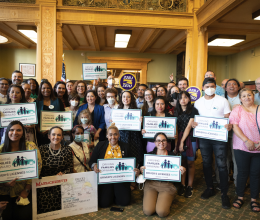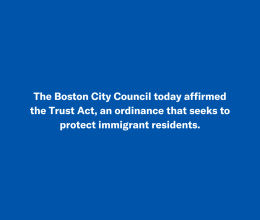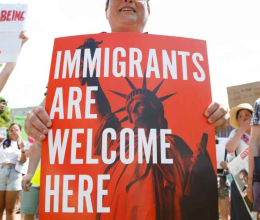In May 2022, the ACLU of Massachusetts, together with law firm Mintz, filed a lawsuit on behalf of Afghans facing danger at the hands of the reinstalled Taliban regime, and on behalf of New England-based loved ones attempting to bring them to safety in the United States through a process called humanitarian parole.
According to the lawsuit, the U.S. government held out the prospect that endangered Afghans could receive humanitarian parole but, when large numbers applied, changed its standards and began delaying and denying their applications.
When the United States’ 20-year occupation of Afghanistan ended in August 2021, the U.S. airlifted more than 100,000 Afghan people out of the country. But the evacuation efforts left thousands of at-risk Afghans behind—including those who assisted the United States and their families. Tens of thousands of vulnerable Afghans sought help from the U.S. government through applications for humanitarian parole, which allows people to temporarily enter the United States, and, once here, apply for asylum or other relief.
In August and early September 2021, U.S. Citizenship and Immigration Services (USCIS) acted with urgency to address applications for humanitarian parole, granting some requests from Afghans who feared the Taliban. USCIS recognized that these Afghans were applying for “urgent humanitarian reasons” that warranted a grant of humanitarian parole under agency standards at that time.
But as applications into USCIS increased, the agency changed course: For two months, as desperate applicants waited, USCIS stopped deciding Afghan humanitarian parole cases; and in November, it began to implement new standards that would ensure the government’s denial of most applications.
The plaintiffs include a female judge who sentenced members of the Taliban, other women who are now in danger because they previously rose to positions of prominence, and people who directly supported the United States in Afghanistan or worked with the U.S.-backed Afghan government, and their loved ones.
Nine months after the fall of Kabul to the Taliban, USCIS’s abandonment of the humanitarian parole process of Afghans has left the plaintiffs stranded and in danger. After months of waiting, they have received either denials or no responses to their applications. One plaintiff applied for six family members, but tragically lost three of them while awaiting decisions on their applications for humanitarian parole.
The lawsuit asks the United States District Court for the District of Massachusetts to require that the plaintiffs’ applications be promptly adjudicated or re-adjudicated under the August 2021 standards for Afghan humanitarian parole.







